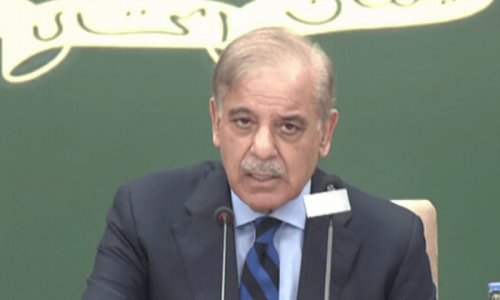Electricity Tariff
ISLAMABAD: Prime Minister Shehbaz Sharif announced on Tuesday that the government would maintain current electricity rates for protected customers who consume up to 200 units of power for the next three months.
This decision provides a temporary relief to these consumers, with the subsidy applying to their electricity bills for July, August, and September.
“The household consumers who consume up to 200 units of electricity will get a subsidy for three months — July, August, September,” Prime Minister Shehbaz Sharif announced at an event in Islamabad.
This announcement follows public backlash against the government’s recent decision to significantly increase electricity tariffs, a move seen as a requirement to secure a loan from the International Monetary Fund (IMF).
Facing severe criticism for imposing financial burdens on the salaried class through the new budget, the prime minister revealed that the subsidy would cost the national treasury Rs50 billion.
He noted that this measure would support 94% of electricity consumers and would be financed through the budget’s development fund. The prime minister also criticized the previous Pakistan Tehreek-e-Insaf (PTI) government for reducing power prices without allocating funds in the budget.
Under this relief package, the cost of electricity for these consumers will range from Rs4 to Rs5 per unit, with K-Electric consumers also benefiting from this subsidy.
Prime Minister Shehbaz explained that the decision was aimed at alleviating the financial strain on ordinary citizens amid rising electricity prices. He emphasized that the summer months are particularly challenging due to high electricity consumption, which tends to decrease as the weather cools in October.
The prime minister expressed confidence that the coalition government would overcome all challenges together and stressed that combating corruption was essential for resolving the country’s economic difficulties.
Earlier this month, the federal government had announced significant increases in electricity tariffs to unlock an IMF program worth over $6 billion. The tariffs for protected consumers were set to rise by up to 51%, and for unprotected consumers by up to 43%, effective July 1, 2024, prior to the prime minister’s subsidy announcement.
For protected consumers using 1-100 units, the tariff was slated to increase by Rs3.95 per unit, from Rs7.74 to Rs11.69 per unit. For those consuming 101-200 units, the tariff was set to rise by Rs4.10 per unit, from Rs10.06 to Rs14.16 per unit.
Unprotected consumers were facing even steeper hikes. Those consuming 1-100 units per month would see a 43% increase, with the tariff rising by Rs7.11 per unit to Rs23.59 from Rs16.48 per unit. Consumers using 101-200 units would experience a 31% increase, with the tariff climbing by Rs7.15 per unit to Rs30.10 from Rs22.95 per unit.
For those in the 201-300 units per month category, the tariff was set to rise by 26%, from Rs27.14 to Rs34.26 per unit. Similarly, the tariff for consumers using 301-400 units would increase by 22%, from Rs32.03 to Rs39.15 per unit.
For higher consumption categories, those using 401-500 units per month would face a 17% increase, with tariffs going from Rs35.24 to Rs41.36 per unit. The 501-600 unit category would see tariffs rise from Rs36.66 to Rs42.78 per unit, also a 17% increase.
Consumers in the 601-700 unit category would see a 16% increase, with tariffs rising from Rs37.80 to Rs43.92 per unit, while those using more than 700 units would experience a 14% hike, with tariffs increasing from Rs42.72 to Rs48.84 per unit.
This temporary subsidy aims to provide immediate relief to the majority of electricity consumers while the government addresses broader economic challenges and seeks to balance public welfare with fiscal responsibility.
I am a dynamic professional, specializing in Peace and Conflict Studies, Conflict Management and Resolution, and International Relations. My expertise is particularly focused on South Asian Conflicts and the intricacies of the Indian Ocean and Asia Pacific Politics. With my skills as a Content Writer, I serve as a bridge between academia and the public, translating complex global issues into accessible narratives. My passion for fostering understanding and cooperation on the national and international stage drives me to make meaningful contributions to peace and global discourse.










